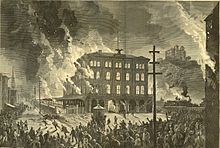Pittsburgh railroad strike of 1877
Appearance

The Pittsburgh railroad strike occurred in Pittsburgh, Pennsylvania as part of the Great Railroad Strike of 1877 in the United States, incidents of strikes, labor unrest and violence in numerous cities across the country, and one of several in Pennsylvania. Other cities dealing with railroad strikes were Philadelphia, Reading, Shamokin and Scranton. The strikes followed repeated reductions in wages and sometimes increases in workload by the railroad companies, during a period of economic recession following the Panic of 1873. In this same period, some companies gave their top management raises.
Quotes
[edit]- A tumult, riot, and mob exist on the Pennsylvania Railroad at East Liberty and in the Twelfth Ward of Pittsburgh. Large assemblages of people are upon the railroad and the movement of freight trains either east or west is prevented by intimidation and violence, molesting and obstructing the engineers and other employés of the railroad company in the discharge of their duties. As the sheriff of the county, I have endeavored to suppress the riot, but have not the adequate means at my command to do so, and I therefore request you to exercise your authority in calling out the military to suppress the same.
- Allegheny County Sheriff R. C. Fife, dispatch to Pennsylvania Lieutenant Governor John Latta, and Governor John F. HartranftMcCabe, James Dabney; Edward Winslow Martin. The History of the Great Riots: The Strikes and Riots on the Various Railroads of the United States and in the Mining Regions Together with a Full History of the Molly Maguires.:79
- It's a question of bread or blood, and we're going to resist.
- Flagman Andrew Hice to a railroad supervisor, July 18 1877, in Lloyd, John P. (2009). "The Strike Wave of 1877". Routledge.
- We're with you. We're in the same boat. I heard a reduction of ten percent hinted at in our mill this morning. I won't call employers despots, I won't call them tyrants, but the term capitalist is sort of synonymous and will do as well.
- Mill worker, speaking of the railroad strikers, in Brecher, Jeremy (1 April 2014). Strike!. PM Press. ISBN 1604864281.
- Meeting an enemy on the field of battle, you go there to kill. The more you kill, and the quicker you do it, the better. But here you had men with fathers and brothers and relatives in the crowd of rioters. The sympathy of the people, the sympathy of the troops, my own sympathy, was with the strikers proper. We all felt that those men were not receiving enough wages.
- Officer reporting the state of his troops to his superior, in Brecher, Jeremy (1 April 2014). Strike!. PM Press. ISBN 1604864281.
- You that know me know that I will obey orders...I have troops who will obey my orders and I tell you, gentlemen, these trains must go through. My troops will have no blank ammunition, and I give you warning of this in time.
- General Pearson, address to the crowd gathered at the station near 28th Street, in McCabe, James Dabney; Edward Winslow Martin. The History of the Great Riots: The Strikes and Riots on the Various Railroads of the United States and in the Mining Regions Together with a Full History of the Molly Maguires.:84
- It was bread or blood, and they could get any number of men to come up and prevent the running through of any train until the matter was arranged with them.
- Testimony of Superintendent, Robert Pitcairn, in Report of the Committee Appointed to Investigate the Railroad Riots in July, 1877, Harrisburg: L.S. Hart, state printer, 1878, retrieved on 22 May 2016:18


